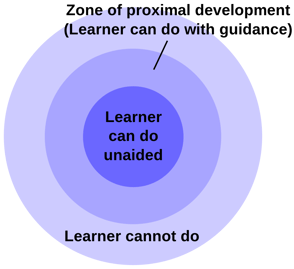Parents sometimes wonder what types of learning supports are available for students who need some extra help. All teachers — be they at a cyber charter school or in a brick-and-mortar setting — want to help their students succeed! Learn more about how PA Virtual achieves this from Heather, one of our Academic Support Teachers!
When it comes to our careers, relationships, or education, we all need extra support sometimes — and cyber charter schools are no exception!
Here at PA Virtual Charter School, we have a number of robust resources that provide learning support for all of our students. These offerings differ based on the developmental and academic needs of students, and serve to bolster their success. In this blog, we’ll explore some of the support options for elementary students, and provide a glimpse into what you can expect at a cyber charter school in Pennsylvania.
Inside the Classroom
Where does support begin? While you’ll find student support in both brick-and-mortar and cyber charter settings, there can be distinct differences in focus and delivery method. At PA Virtual, the first layer of support for students starts inside the classroom. For educators, the goal is to partner with parents to provide students with the education they want, from the virtual experts they deserve!
The Value of Academic and Developmental
In their book Classroom Instruction That Works, educational researchers Robert Marzano, Debra Pickering, and Jane Pollock note that students who need extra support often benefit from inclusive classroom groupings, when appropriate to the task. These groupings expose them to different ways of thinking and approaches among peers. PA Virtual students in grades kindergarten through fourth are assigned to a class that is a heterogeneous mix of academic and social developmental levels. Therefore, right from the start, students are immersed in a supportive academic environment.
The next layer of in-classroom support drills down further into learner diversity, and becomes specific to each student’s needs. Though students benefit from their overall exposure to developmental diversity, they also need separate support from and with classmates of a similar level. This approach allows for students to progress together for some subjects, and engage effectively with their own learning styles. For example, students are grouped by reading level for English Language Arts (ELA) instruction. Those who need more time to process and learn do not feel pressured to compete with or emulate peers who are inclined to acquire knowledge at a swift pace. That being said, students who are more fluent readers and who have a greater stamina are able to move at a pace that is comfortable and suitable for them.
Data, Data, Data!
Here at PA Virtual Charter School, we use diagnostic data from assessments to form fluid, flexible groups. Assessments can be informal or formal and determine the student’s mastery of the content and academic standards. In grades kindergarten through second, students undergo ELA and mathematics assessments three times a year in order to help determine an optimal group placement. Academic support teachers can then use data to provide more individualized instruction.
PA Virtual also uses an interactive learning platform that provides students with assessment and practice across a variety of subjects, based on state standards, so as to help boost their proficiency. Study Island draws on state standards to deliver content that helps students meet Pennsylvania requirements, while providing teachers with real-time data.
Response and Adaptation Using Differentiated Instruction
Supports become even further individualized as teachers work with students. Differentiated instruction is the vehicle that drives learner-specific supports. In her book How to Differentiate Instruction in Academically Diverse Classrooms, educational researcher and author Dr. Carol Ann Tomlinson asserts that instruction can be modified in content, process, and product. Furthermore, she posits that student differences become important elements in teaching and learning. PA Virtual teachers monitor and adjust how content is taught in small groups, so as to better reach students. Learning happens at different rates and in different modes, and our educators know that the product of learning has the potential to be as unique as each child!

(Picture courtesy of Dcoetzee via Wikimedia Commons)
By drawing on differentiated instruction and learning styles, teachers can best target needs within each student's Zone of Proximal Development, a concept developed by psychologist Lev Vygotsky. This instructional practice is helpful to students because the teacher offers instructional scaffolds to support the student as they progress in a skill or concept, from the outer ring to the center, as shown in this illustration. A learner’s Zone of Proximal Development is dynamic; therefore as a student’s developmental ability increases, the Zone shifts to more complex skills and tasks. Upon that, prepared with further data to support instructional decisions, the teacher will regroup students. Thus the cycle continues.
Outside the Classroom
Learning doesn’t stop when students leave the core classroom! In order to support their continual learning as they interact with their environment, the elementary school offers a number of resources.
- Academic Support classes
These offerings provide students with the opportunity to grow their early literacy skills in grades K-2, and expand and refine those competencies in grades 3-4. By reinforcing concepts and coaching students at a pace that is different from that of the core classroom, instructors who are trained with specialized knowledge in the science of reading can provide more individualized interventions and support. - Recorded Lessons
All synchronous elementary school lessons for core academic areas (mathematics, ELA, science, social studies) are recorded. Students who need or want to review the classes and related content can find the recordings in Jigsaw, the main platform used in kindergarten through eighth grade. - Individualized Help and Tutoring
Students can also work directly with their teachers to address learning concerns, and receive help as needed. - English Language Learning (ELL)
Non-native English speaking students can receive ELL support, in order to help them achieve their academic goals. - Special Education Services
We have an array of special education services available to students who qualify.
Supplemental Digital Resources
With so many online resources at teachers’ fingertips, incorporating supplemental digital resources and tools into a student’s learning plan adds yet another extra layer of support based on individual needs. At PA Virtual, teachers have a comprehensive library of resources and tools that complement curriculum and instruction.
Notably, at the elementary level, several resources are available as supports that teachers can pull from, including:
- Learning A-Z
Learning A-Z is a suite of applications that offers complementary, engaging digital resources. This includes leveled text, decodable readers, vocabulary activities, writing activities, phonics activities, comprehension activities, printable worksheets, and games to foster literacy growth. Even more amazing with Learning A-Z is the Spanish library, so ELL students can have digital access to quality leveled text. - iXL
This diagnostic learning tool assists students, parents, and teachers with assigning just-right content area practice to achieve mastery in skills associated with curricular standards.
Our teachers are always investigating and learning more about additional tools to bolster student success. Kindergarten teacher Janese Claar, for example, uses interactive instructional tool Nearpod as another way to assess student comprehension. She also uses it for real-time observation during class, observing students as they work in order to identify any potential academic concerns.
In addition, Ms. Claar and the kindergarten team use Reading Eggs, a research-based literacy program offering fun games, activities, and online books that complement and help solidify reading comprehension. Furthermore, Reading Eggs designs a pathway of learning as students make progress in reading skills.
Conclusion
Education thrives on innovation and new tools that enhance the classroom experience. PA Virtual teachers evaluate, adopt, and implement programs, tools, and resources aimed at helping students succeed, and provide additional support for those who need it. Just like their brick-and-mortar counterparts, cyber charter teachers are eager to find ways to make learning exciting and relevant, while preparing students for college, the workforce, and beyond.
 About the Author: Heather Alcott is an Academic Support Teacher in the elementary school at PA Virtual.
About the Author: Heather Alcott is an Academic Support Teacher in the elementary school at PA Virtual.
Looking for other ways to help your child succeed in cyber charter school? Read our quick tips to on keeping your student focused throughout the day!
Photo credits to Megan Soule on Unsplash, and @Dcoetzee/Wikimedia Commons/own work/CC0.





Comments